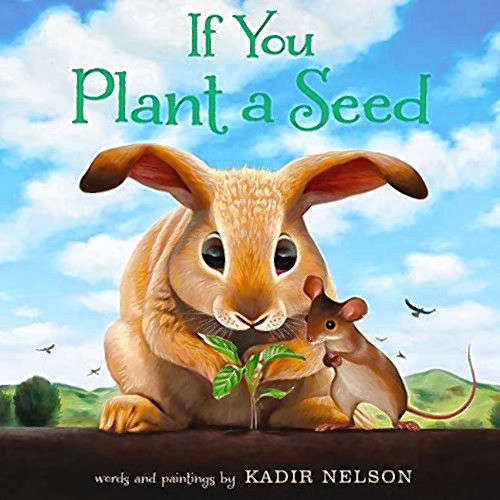If You Plant a Seed
By Kadir Nelson
(children’s picture book, 2015)
If You Plant a Seed is a gorgeous children’s read-aloud with a ton of heart. You’ll be instantly drawn in by the sumptuous oil-and-canvas illustrations by author and artist Kadir Nelson, who deserves to be a household name. Nelson has won numerous awards, including three Caldecott Medals for his illustrations of children’s literature. While his work often focuses on African American history (his portrait of Henrietta Lacks now hangs at the National Portrait Gallery in Washington, D.C.), he turns here to familiar animals in a garden setting to teach even the youngest readers a lesson about character.
In the spring, Field Mouse and Rabbit plant a number of seeds. Together, they nurture their garden plot, wait patiently, and eventually celebrate the yield that comes from their efforts: crisp, tasty veggies, ripe for the picking. But then … the Birds arrive. The Birds try to make off with Mouse and Rabbit’s harvest. Mouse and Rabbit become defensive and greedy, and less-than-cordial behavior escalates on all sides. Before long, the “seed of selfishness” planted by the animals has grown into a “heap of trouble” (including lots of burst cherry tomatoes on all of their heads).
Finally, Field Mouse decides to share the bounty, rather than hoarding it all for herself. The appreciative Birds, in turn, scatter sacks of seeds onto the soil. This time around, all of the animals tend their garden together. At harvest time, they share in the feast that has come from their labor and cooperation — and it’s even grander than what Mouse and Rabbit were able to achieve on their own!
This book has very few words, letting the illustrations do most of the heavy lifting. For this reason, it’s a great way to introduce meaningful themes to even the youngest audience. Through a cast of charming characters (again, I cannot get enough of these illustrations), the book demonstrates cooperation, generosity, reciprocity, patience, good stewardship, and reaping the rewards of one’s own work. Nelson elegantly incorporates metaphor (the “planting” of goodwill leads to a “harvest” of friendship) to help children learn these very important aspects of good citizenship. Readers of all ages will delight in the success of Mouse, Rabbit, and friends, and may even find themselves craving a fresh salad afterward.
Visit Concord Public Library online at concordpubliclibrary.net.
Faithe Miller Lakowicz









